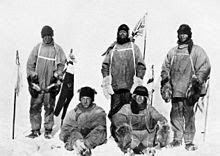 |
| SCOTT'S GROUP -- ONE DAY AFTER THEY DISCOVERED AMUNDSON REACHED THE POLE ALREADY |
Hundred years ago 12 members of the Captain Scott’s
exhibition set out to find the body of their leader and four others who stayed
with him. It was eight months after the failed Antarctic exploration.
The youngest of the original team was the leader of
the search party a 26 year old Apsley Cherry-Garrard. He found the tent in
which the legendary Captain Scott perished. He is now known as Scot of the
Antarctic. It was only 11 miles from the supply depot which would have saved
them.
The story of Captain Scott valiant struggle became
legendary but hardly anybody knows about the torment of the rest of the
Antarctic expedition. For the rest of their lives they suffer guilt of failure,
pain and depression.
After they found the frozen bodies of Scott, Edward
Wilson and Henry Bowers, Cherry-Garrard wrote in his diary: “We have found them
– to say it has been a ghastly day cannot express it – it is too bad for words.”
The bodies of Captain Lawrence Oates and Petty
Officer Edgar Evans were never found.
.jpg) |
| APSLEY CHERRY-GARRARD |
Cherry-Garrard could never forget his role in the
Scott’s expedition. For the rest of his life he always felt guilty that he
could have done something more to save Scott. Two months after Scott had made
the last of the journey to the Pole only to find that the Norwegian Roald Amundson
had been there already and planted the flag. Cherry-Garrard was ordered to go
to the depot and await, hopefully, Scott’s arrival on 10 March 1912.
However, as faith was against them Cherry-Garrard’s
dog team was in poor health and running out of dog food he had to cut the
ration as well. He decided to turn back before the date he should have met
Scott.
After that he always felt regret to have made that decision and thinking
he might have saved Scott’s life.
His torment showed for the first time when on the search
for Scott’s body he mistook another mule team at One Ton depot for Scot’s Tent.
He almost had a break-down blaming him selves to have abandoned the depot too
soon and therefore causing Scott’s death. Back in Britain he suffered great depressions.
The once healthy and fit man became bed-ridden caused by his mental turmoil.
For many years he fought the demons created by his memory. Later he found some
peace in writing his Book “The Worst Journey”. It reveals the anguish at the
polar expedition.
Dr Edward Leicester Atkinson, the polar’s party
surgeon, had his own depression to deal with after he came back to Britain.
Some people accused him of pushing his dog-team to far when he was looking for
Scott. Others accused him of not established a dog food depot which led to
Cherry-Garrard not waiting for Scott.
When the First World War broke out Atkinson joined
up to overcome his struggles. He survived the Somme and was also fighting in
Russia but when his ship HMS Glatton was in Dover an explosion occurred. Atkinson received massive burns and hot
shrapnel went into him. He also was blinded but in spite of all that he saved many
men. Just before his 48th birthday he died suddenly in 1929 while
travelling on another ship.
Cherry-Gerrard received another great shock when he heard
he lost his friend who stuck by him all these years.
Also Edward Nelson, marine biologist, could never get
over the Scott’s failure and discovery of his body. On his returning to England
in 1913 he met a young lady named Violet Helen Thomas. They married in the same year
later. For unknown reason they chosen the 12 November for their wedding day.
The day on which they found Scott’s body.
When war broke out within a few months Nelson joined
the Royal Naval Volunteer Reserve.
The trauma of war together with the horrors of the
Antarctic changed him completely. Nelson could not bear to be with his wife
and young daughter and in 1919 they separated. He went to work in a Scottish
fishery. Four years later he was found dead in his office. He had injected
himself with a huge amount of poison.
While Captain Scott and Captain Oates, whose famous
words were “I am going outside and may be some time” went into history and
became legends the rest of the expedition men were no less heroic for their struggles
having to live with those memories.
They should have been all recognised, equally, and
gone down in history as legend.


No comments:
Post a Comment